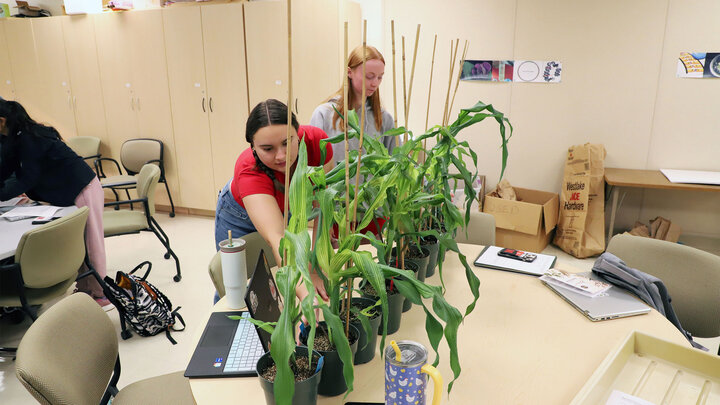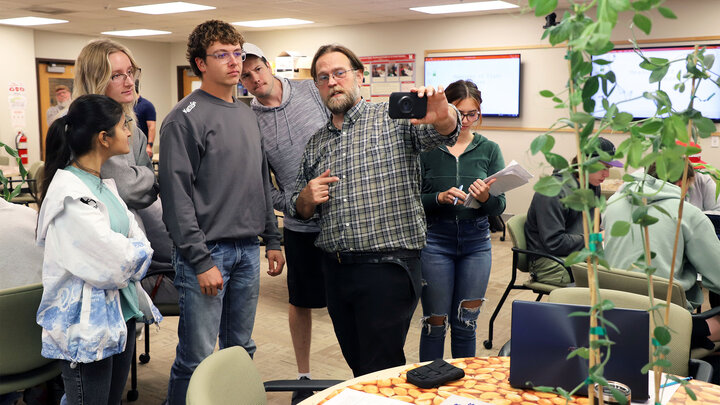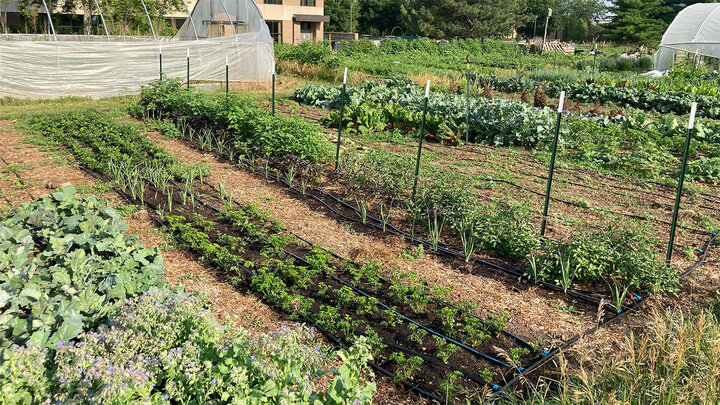“Students learn best by applying what they hear in class to real-life situations,” David Holding said.
Holding and Don Lee, both professors of agronomy and horticulture, wanted to create a new plant science lab where students could engage with the core principles of plant physiology.
Holding and Lee have taught Plant and Landscape Systems 131 Plant Science since 2009. The labs connected to the course feature in-depth plant growth experiments that test the effects of different abiotic treatments on various crop plants, provide critical links to physiological concepts learned in class, and fulfill the Achievement-Centered Education 4 requirement of PLAS 131.
The labs have improved and evolved over the years. In 2020, Holding incorporated the adjustable CO2 chambers in the East Campus greenhouses to perform experiments. He also used the Beadle Center growth facilities for daytime and nighttime heat stress, variable light quality and drought experiments. In 2023, students conducted a whole-semester growth experiment using these abiotic variables on various quick-flowering crops. Within one teaching semester, students measured growth variables over the entire life cycle of a plant, from germination to flowering and seed set.
Recognizing that the experimentation in Plant and Landscape Systems 131 Plant Science had expanded considerably beyond the three-credit, ACE 4 level, Holding and Lee designed a one-credit course called Experiments in Plant Science, provisionally assigned PLAS 291, which will become PLAS 135 starting in the fall of 2025.
“We wanted the lab to stay with them and maybe even inspire new interests and career possibilities,” Holding said. “This is part of the department’s push for a pipeline in science literacy education.”
In this new course, students perform novel research to investigate how a changing environment can induce changes in vegetative and reproductive growth and anatomy. The other main goal of the course is to engage students as early as possible in scientific literacy and data handling.
The course was approved and taught for the first time in the fall of 2024 to agronomy, plant and landscape systems and plant biology majors. It involved a semester-long experiment with week-by-week guidance and assignments on data collection, interpretation and presentation leading to an advanced experimental write-up, PowerPoint and oral presentations, and peer review assignments.
“One of the most satisfying moments of my teaching career was listening to and grading the final oral presentations and seeing how much the students had grown and learned about crop plant responses to a changing environment and the underlying physiology,” Holding said.

Agronomy major Livia Farmer (left) and plant and landscape systems major Madelyn Smith survey 5-week-old, Fast-Flowering Mini-Maize plants grown in various CO2 environments during the new Experiments in Plant Science course.
The course leverages instruction from several department faculty, along with Holding and Lee — Christian Stephenson and Christian Elowsky, both assistant professors of practice in agronomy and horticulture, who provided instruction for several weeks in the middle of the course. They also utilized Doctor of Plant Health graduate student Garrett Kuss as a graduate student teaching assistant and senior agronomy major Bryce Wemhoff as a teaching assistant.
“The experiential learning in this course will be very meaningful as they [students] continue their careers,” Stephenson said.
Experiments in Plant Science is a stand-alone course that includes technologies to measure stomatal conductance and density, chlorophyll fluorescence, and vegetative and reproductive growth. It also contains instructions in Excel, statistics and experimental design. Non-agronomy and horticulture majors taking this course complete a shorter growth experiment and still satisfy their ACE 4 requirement.
“Students in the course were very actively engaged with the observations they were making and learning not only about the fundamentals of plant biology, but how, as plant scientists, to design experiments, make observations, and collect and interpret data,” Stephenson said. “Exploring different tools and methods for evaluating their plants was a great way to build their understanding and curiosity.”
PLAS 131 Plant Science and PLAS 135 Experiments in Plant Science will be part of a pipeline of science literacy instruction in the Department of Agronomy and Horticulture, feeding into PLAS 230 Technical Reporting and PLAS 403/803 Scientific Writing and Communications, among others.
More photos at IANR told with Exposure.




